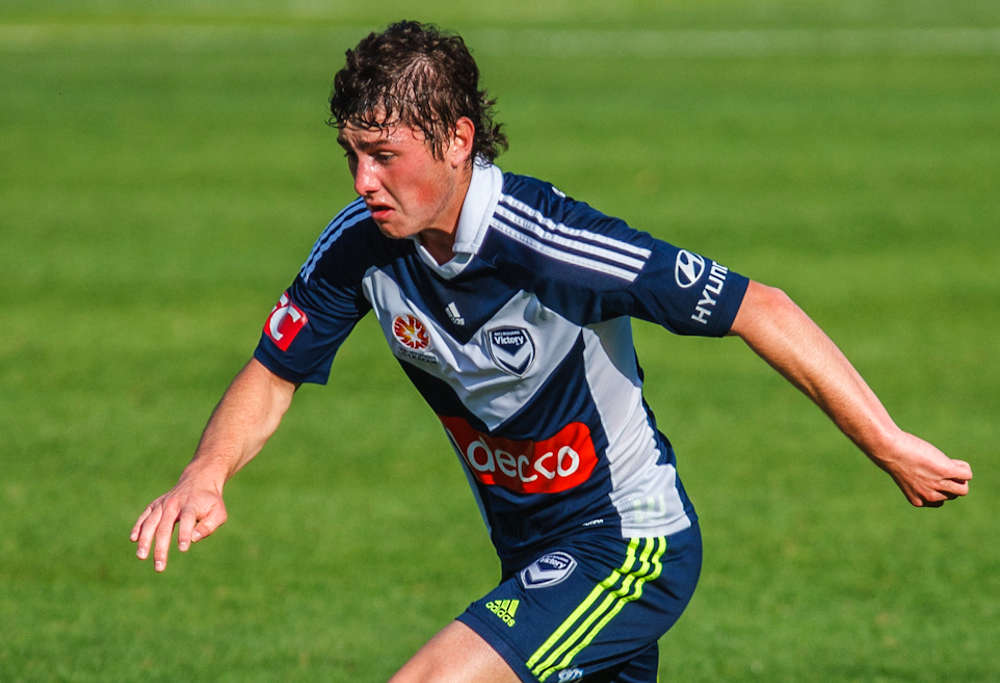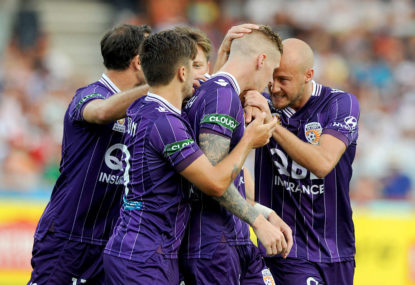Perth are the only A-League team to have scored and conceded 40 or more goals so far this season. It’s a novel statistical oddity, and one that broadcasts mixed messages to the rest of the league.
The Perth attack is one of the competition’s most potent, that Diego Castro, Adam Taggart, Andy Keogh stroll out in every match confident of their ability to pierce and puncture any opposing defence.
Kenny Lowe’s team have failed to score in just two games this season – curiously, in twin 2-0 losses to Central Coast, of all teams – and have seven times scored three or more goals in a match.
This should strike fear into the hearts of the teams that may face the Glory in the finals, but the impact is softened by the goals-conceded column, which is somehow the worst in the division. Yes, even bottom-placed Adelaide have conceded fewer goals than Perth, and as much as the Glory’s opponents must tremble slightly at the sight of Castro et al, they are also becalmed by the knowledge that they too will almost certainly score.
This kamikaze impression has a tactical explanation, naturally, and the conclusions to be drawn from it do not bode well for Perth in the finals.
Against the Victory last Saturday, Perth’s flaws and virtues were on full display; there are few teams that seem so unashamed when revealing the extent to which they skirt the defensive side of the game.
After two minutes, Perth allowed the ball to bounce twice in box, following Jason Geria’s long throw. An odd sight, to be sure, and one that struck a foreboding chord. After five minutes, Castro – perhaps the best tight-angle shooter in the league – put Perth in front, predating on a chance fashioned entirely against the run of play.
Perth had, in the opening throes, seen almost nothing of the ball, with the Victory attempting and completing passes at a rate of supremacy of almost four-to-one over the Glory. They had been defending in numbers, had now scored, and returned to a deep-set position. It’s no wonder that, from then on, the match unravelled for Perth.
Besart Berisha’s equaliser was a free header at the near post. From a free kick on the left, Berisha was allowed essentially an untouched run toward a prime heading spot, with Aaron Williams jogging belatedly in his wake. It was a mixture of positional indiscipline and a lack of effort from Williams, and a fine delivery from Marco Rojas. This, though, was far from Perth’s worst defensive miscarriage of the evening.

Two minutes after the equaliser, Melbourne broke with speed following a Perth corner. Marc Warren made the odd decision to sprint into the centre of the pitch, towards two other Perth defenders, instead of staying close to Fahid Ben Khalfallah on the right, of whom he had been aware, having looked over his shoulder before making his move.
The extra space and time granted to the Tunisian allowed him to cross with venom for Rojas, who only barely missed making contact. Warren’s was a fretful tendency, retreating toward the goal when panicking while back-tracking.
In the 39th minute, again, Warren was drawn into a central defensive area, drifting towards the ball as Rojas tussled with another Glory defender under an awkwardly bouncing ball. He eventually was responsible for the clearance, but Khalfallah was again totally free on the right – in fact, the Tunisian ends up in the box by the time the sequence ends – so much so that Aaron Williams was seen lurching toward him suddenly just as the move broke down.
Just before halftime, with Berisha juggling the ball, pinned down on the right side of the byline, the Albanian looped a blind cross into, as it were, the mixer. Josh Risdon and Fahid Ben Khalfallah were waiting in the middle, and as the ball dropped at speed toward them, Ben Khalfallah seized physical control of the skirmish, leaped and headed the ball past Liam Reddy and into the corner.
Risdon is listed as 3cm shorter than Ben Khalfallah, a negligible difference. He also had goal-side position on the Victory attacker, and should not have been beaten in the air like that. A simple levering of the Tunisian away from the flight path of the ball would have kept the Glory level going into halftime.
Lowe was given the chance to rally his troops, to reassert to them how important a game this was for them – Perth had a chance to go outright third – not to mention how meaningless this fixture was for the Victory, who have sewn up second place.

But within seconds of the second half starting, Rostyn Griffiths was robbed of the ball by James Troisi, only for the referee to save Griffiths, wrongly awarding a foul in favour of the Glory. This was the most visible example of the Glory midfielders – namely Griffiths and Rhys Williams – not being able to compete athletically with the Victory attackers.
So much of the Victory’s threatening build-up play involves swift give-and-go passing between Rojas, Troisi and Ben Khalfallah and Berisha, who is perhaps the best back-to-goal pivot in the league. Such play seeks to expose the twitchiness of the central defenders pinned behind Berisha, as well as testing the mobility of the defensive midfielders, asking them to cover and track the wild flurry of surging Victory attackers.
The angles at which Troisi and the others pierce the defensive line, and the subtlety of Berisha’s lay-offs means the more statuesque defensive midfielders – like Griffiths – begin to resemble traffic cones in a training exercise. According to the A-League’s game stats, R. Williams and Griffiths won one solitary tackle between them all evening.
Victory’s third goal was a counter-attack much like the unsuccessful manoeuvre attempted in the 39th minute, except this time it was capped beautifully by Rojas’ curling right-footed shot.
Again, it seemed as though there were too many Perth lingerers on the edge of the Victory box, largely loitering during a Glory free kick, pinged in from their left. The Victory cleared, and had only to complete the relatively pedestrian task of passing through the Glory players rooted in no man’s land, as a gaggle of loose defenders tore back to try and foil the impending break.
Troisi clipped the ball past Rhys Williams, then Ben Khalfallah did the same past Aaron Williams, releasing Rojas on the left. Warren was his marker, once again having traipsed all the way across from his flank, leaving Berisha unmarked in the middle. Rojas might have squared it to the Albanian, but instead took on Warren – who must have looked like barbecued chicken to the tricky New Zealander – leaving him sprawling with a simple cut inside. His shot was perfectly placed just inside the post.

Again, this concession exposed how a team without a secure anti-counter-attack system in place can be torn to shreds by three simple passes.
Lowe, having tasked his centre backs with going forward to contest the free kick, appeared unconcerned with putting in place a contingency plan to protect against the Victory, who are, of course, one of the best counter-attacking teams in the league.
A few minutes after the third goal, the Glory nearly scored themselves, with Lawrence Thomas saving well with his feet to deny Chris Harold. Marc Warren had capitalised on a deathly hesitancy by Jason Geria, skipping through the heart of the Victory line, playing in Harold. But then, the threat nullified by Thomas, a three-on-two break sprung up for the Victory on the counter.
The Glory were saved by the offside flag, a decision Kevin Muscat and Ben Khalfallah visibly raged over – Ben Khalfallah to the point of earning a booking – and we were unable to see a replay of the incident. Regardless, a better run or an earlier pass would have again ripped open the Glory defence, with Warren over-committed, and no one mitigating for his absence.
The lack of positional awareness from the Perth fullbacks, Warren in particular, continued to put them in dangerous situations. Around the hour mark, with a neat move between Castro, Taggart and Keogh breaking down, Warren was suddenly made aware that he was nowhere near Rojas, again, by Troisi’s lofted ball. Warren was seen plodding back, and only Troisi’s heavy foot – not for the first time, strangely, in the match – allowed Reddy to scamper out and sweep clear, foiling a promising two-on-two.
Melbourne’s fourth goal, a Troisi screamer, applied an emphatic exclamation point. Warren – the poor victim of a Bruce Kamau dribbling exhibition at this ground in the raucous 3-3 draw against Melbourne City in December – was scorched repeatedly by Rojas in the latter stages.
The above examples, that flowed liberally throughout the entirety of the contest, illustrate how Perth seem to be doing very little to mitigate for their defensive ineptitude, apart from trying simply to out-score their opponents. The thing is, the finals are populated with teams, like Sydney FC, who are very good at defending. Even teams like City, who are a little more vulnerable, may well be pushed up into a higher level of intensity by the finals atmosphere.
Perth cannot hope to approach a knockout tie with the plan that saw the Victory pick them off with such ease. Last week, in the Big Blue, we saw what a defensively-capable manager like Graham Arnold did when he saw Rojas and the other Victory attackers trying to exploit his full backs, like they did Warren and Risdon here; he sent in Brandon O’Neill to fill the space, to mitigate the potential damage.
We even saw Muscat deploy Leigh Broxham in a similarly defensive-minded midfield role against the Glory, attracting very little attention, but offering vital support to Geria and Daniel Georgievski when they pushed forward.
Lowe didn’t do the same, and it was part of the reason why his team were put to the slaughter.
As an aside, this match also confirmed how valuable Ben Khalfallah is to the Victory, with his passing especially vital on the counter. Jai Ingham, who was a substitute, cannot offer the same passing range.
It’s easy to be seduced by Castro and Keogh, and by the heady allure of scoring goals. But if it is pursued, tongues wagging and eyes bulging, at the expense of defensive discipline, then the higher standard and heightened intensity of the finals will expose how foolish that pursuit is.
We had a scarcely believable 5-4 result in last year’s finals, but that was not, it must be asserted, really an example of mature, considered football, more a gaudy display of what happens when two teams allow themselves to lose control and adopt a mutual ‘no defending allowed’ policy.
Perth have rollicked through the 2016-17 season with a similar policy in place, and the mind boggles at what might happen to them in April.
































































































